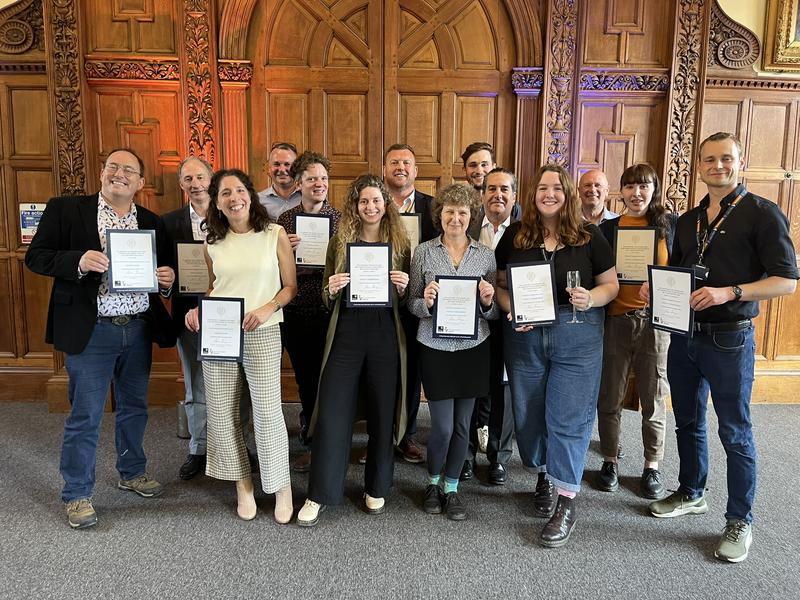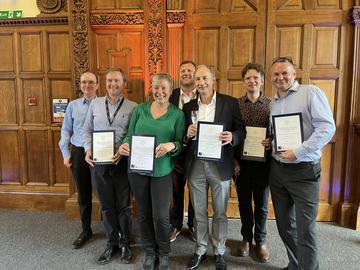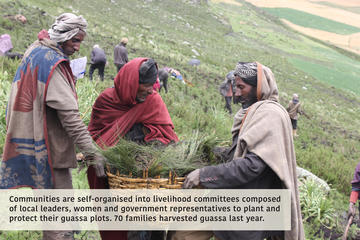Department of Biology recognised in the Vice Chancellor's Awards
We are pleased to announce that four Department of Biology teams were shortlisted for a Vice Chancellor award this year with two being highly commended by the panel. There were 250 award nominations across 11 categories this year and the shortlisted biology projects span across professional services, teaching, research engagement and environmental sustainability.
On Tuesday 7th May, the teams took part in an awards showcase at the Western Library where they presented their work to colleagues across Oxford and on Wednesday 8th May they attended the awards ceremony to hear of the winners and highly commended projects.
Kindly join Mark and Tim, the joint Heads of Department, in extending congratulations to our outstanding colleagues who have significantly contributed to the department's achievements in teaching and research. Tim says
''We were so proud of the 4 biology teams that were nominated for the 2024 VC awards. Making the shortlist was a real achievement for every one of them. Given there were only 9 MPLS nominated teams on the shortlist, Biology is leading the division in terms of nominations, and it was wonderful to see so many biologists at the ceremony in the Sheldonian and at the Exam Schools drinks reception afterwards. Congratulations to everyone who was nominated, with a special shout out to our WildCRU Diploma team and Biodiversity Net Gain team who were highly commended.''

The shortlisted biology teams stand with our joint Heads of Department
Inclusive Teaching and Assessment Award: Training conservation scientists and practitioners from around the world (highly commended)
Team: Claudio Sillero, Egil Droge, Annie Kerriage, Paul Johnson, Jorgelina Marino, Darragh Hare, Amy Dickman
Part of the Department of Biology, the Wildlife Conservation Research Unit’s (WildCRU) mission is to transform wildlife conservation through world-class research, training and implementation. The Recanati-Kaplan Centre Post-Graduate Diploma in International Wildlife Conservation Practice was established in 2008, as an integral part of WildCRU’s training goals. The 8 month residential course is taught as a collaboration between the Departments of Biology and Continuing Education and with close links to Lady Margaret Hall and admits aspiring young conservationists from the Global South who would not normally have the opportunity to attend a world-class university.
The course involves personalised teaching in wildlife ecology, monitoring, management, and conservation and the students interact with scientists and practitioners across many disciplines, including social sciences, economics and ethics. They are exposed to different biodiversity conservation perspectives and learn how experiences from other countries can be adapted to the conservation problems they have experienced in their own. This is complemented by practical skills, from first aid to fundraising to scientific writing and the students complete the course with a customised research project.
The course's alumni have become a vital network of conservationists worldwide, maintaining mutual support beyond their time at Oxford and thus significantly amplifying the diplomas longer term influence.

Research Engagement Award: Influencing the design and implementation of Biodiversity Net Gain in England (highly commended)
Team: Sophus zu Ermgassen, Thomas Atkins, Joseph Bull, Amber Butler, Natalie Duffus, Hannah Nicholas, EJ Milner-Gulland
Shaping England’s new biodiversity net gain policy | NERC Impact Awards 2023
The Biodiversity Net Gain policy in England is a potentially transformative national sustainability policy, aiming to fundamentally change the incentives within the construction sector so that new infrastructure regenerates, rather than destroys, biodiversity. The Oxford Biology team has significantly impacted the development and implementation of this policy, leading to improved guidance to industry, increased public awareness and increased funding for local authorities to support the policies implementation. They have appeared in debates in the House of Lords, invited to address the Environmental Audit Committee, appeared on BBC Countryfile and popular podcasts, and featured in tens of mainstream media articles. They have been invited to take on expert advisory roles at Natural England, the UK Treasury, and the Green Finance Institute. Overall, their efforts will result in better environmental, economic and social outcomes for the policy.
Enhancing Oxford’s Professional Services Award: Planning the shared building operations model for the Life and Mind Building (shortlisted)
Team: Ian Bishop, Mark Butler, Jason Hogg and Rob Bryant (Department of Biology), Tracy Tompkins, and Andrew Allen (Department of Experimental Psychology), Nigel Cribb (Estates) and Ed Moar (MSD).

The cross divisional LaMB professional support team.
This project focuses on developing an innovative operational management model for the new Life and Mind Building (LaMB), which is set to open in 2025. The LaMB will house the Departments of Biology and Experimental Psychology as well as some of the teaching of the Department of Biochemistry and this project has involved a cross-divisional team made up of professional services and support staff. The team members who have been involved have invested a large amount of time and effort in contributing to finding the optimum solution for managing the building operations in the LaMB, whilst developing knowledge of how the new Legal & General/University of Oxford strategic partnership operates. The aim is to enhance collaboration, efficiency, and compliance while supporting the academic mission of the university and may be an important model for the university going forwards.
Key aspects of the project include:
- Collaborative efforts across divisions and with Estates Services to ensure compliance and comprehensive management.
- Creating a cost-effective solution by removing duplication of roles and encouraging innovative processes.
- Producing a detailed Service Level Agreement (SLA) to guide ongoing evaluation and adaptation.
- Applying lessons learned to develop similar strategies for other shared services.
- Incorporating sustainable technologies and strategies to minimize energy consumption and enhance biodiversity.
- Sharing lessons learned across the wider university.
Environmental Sustainability Award: Biodiversity friendly futures for the highlands of Ethiopia (shortlisted)

Team: Jorgelina Marino and Girma Eshete
In the highlands of Ethiopia, environmental degradation exacerbates poverty among local communities reliant on natural resources. The Biodiversity Friendly Futures project supports communities and traditional institutions by promoting alternative sustainable livelihoods. Two key initiatives, "Guassa takala" and "Asta mar", involve cultivating a native species of grass and producing highland Erica honey, respectively. These initiatives not only provide financial benefits for communities but also contribute to ecological restoration breaking the loop between environmental degradation, biodiversity loss and poverty among local communities dependent on natural resources in the Highlands of Ethiopia.
The full list of winners and more about the awards can be found here

